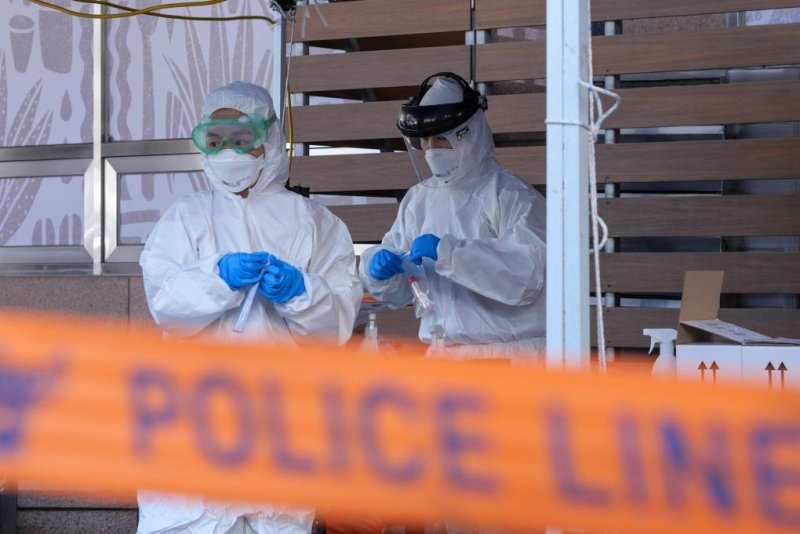1 of 4 | Health workers wait on Wednesday to test residents outside a building in Seoul where a cluster of coronavirus infections broke out. Photo by Thomas Maresca/UPI
SEOUL, March 11 (UPI) -- A new cluster of COVID-19 infections has sprung up in South Korea based around a call center in Seoul, raising concerns of a wider outbreak in the country's largest city.
Seoul Mayor Park Won-soon said Wednesday 93 patients connected to the call center were confirmed to have the novel coronavirus infection after 207 employees and their families were tested.
"The building was immediately closed, and Seoul city started disinfecting," Park said at a press briefing.
Health authorities are also investigating about 550 other employees of the business on neighboring floors in the building, Park said.
The building is located in the southwestern neighborhood of Sindorim, near a busy subway station where several transit lines converge, and Park said the Seoul Metro performed an extensive disinfection campaign on the station and all the trains on the line taken by infected patients.
There are also a number of residential floors in the high-rise building that houses the call center, and on Wednesday health workers in biohazard suits were stationed at an operations center outside the entrance, taking temperatures and mouth swabs from those entering and leaving to screen for the coronavirus.
Lee Hye-Young, a public affairs officer with the Guro District office, the municipality where the building is located, told UPI that officials are still working to confirm the complete list of the building's residents.
She said health officials have traced the original source of the coronavirus at the call center to an employee who lives in Nowon district, in the northeastern part of the city, but they do not yet know how that patient was infected.
As many employees of the call center live in other districts and neighboring cities of the Seoul metropolitan area, the investigation to trace all at who are at risk or infected is complex, Lee said.
"It's too early to predict anything" about how far the call center group transmission will spread, she said.
In the meantime, local residents and people who work in the area around the call center building are living with a renewed sense of concern after the coronavirus spread had seemed to be slowing in South Korea.
"After I heard about the [call center] infections, I was very worried again," said Im Seon-woo, 38, who works at a nearby office. "It feels like we can't move around freely."
On Wednesday, the Korea Centers for Disease Control and Prevention announced that the number of COVID-19 cases in the country rose to 7,755, with 242 new patients confirmed on Tuesday, an uptick after the rate of new infections had been slowing.
The overwhelming majority of cases remain concentrated in the southeastern city of Daegu and its neighboring North Gyeongsang province, which together account for around 90 percent of patients.
More than 60 percent of total cases are tied to a minor religious sect, the Shincheonji Church of Jesus, whose church in Daegu was at the center of the outbreak that has swept through South Korea over the past three weeks.
However, smaller clusters of the infectious disease have been tied to locations such as hospitals, apartment complexes and even a Zumba class, and health authorities are trying to contain these group transmissions from spreading into public outbreaks.
Large events, religious services and public rallies have been canceled, while the Seoul city government has asked businesses such as karaoke parlors and music clubs to curtail operations. On Wednesday, the mayor called on the rest of the city's call centers to allow for remote working when possible.
"There are 417 call centers in Seoul, and the city recommends that they work from home," Park said.
Seoul has a population of around 10 million and its greater metropolitan area totals 25 million people, or nearly half the country's population, sparking worries about the potential of a mass transmission.
On Wednesday, the city's confirmed COVID-19 cases rose by 52, for a total of 193.















